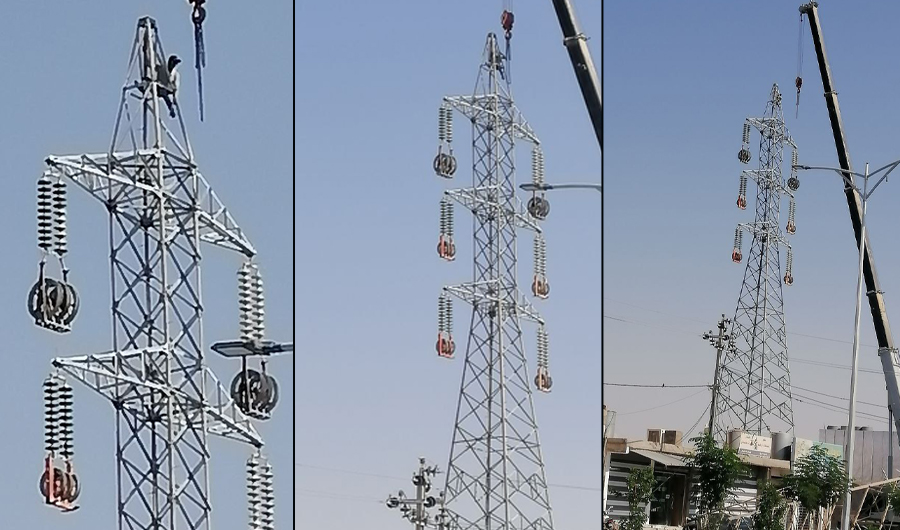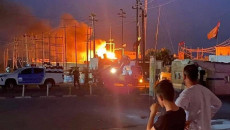Several neighborhoods and areas in the northern, oil-rich city of Kirkuk suffer from a decline in the number of hours of national electricity supply, which has affected the livelihood of some shop keepers and caused resentment among citizens as the summer is still scorching.
According to (KirkukNow) follow-up, the reason for the power outage is due to the maintenance work carried out by the Electricity Distribution Department, which began a few days ago to erect two towers to transfer power to Kirkuk from the power plant in Dubiz district, 35 km northwest of Kirkuk.
“The national electricity is cut off from seven in the morning until eight in the evening, and when the electricity comes back, it will not help us, because at that time we have closed our shops,” says Fatima Arsalan, a women's dressmaker in the Rahimawa neighborhood.
national electricity is cut off from seven in the morning until eight in the evening
Arsalan indicated that the electricity of private generators cannot be used to run sewing machines that need more electrical energy.
The national electricity and the electricity of private generators are down in most areas of the city of Kirkuk from 8 am until 11 pm.
Early August, the Kirkukis have been complaining for a week about the sharp decline national electricity supply which led to concerns of an increase in the fees of the power supplied by private diesel generators.
According to the follow-ups of (KirkukNow) correspondent in different neighborhoods and regions of Kirkuk province, citizens are supplied with national electricity daily for 6-7 hours a day during baking summer.
Adiba Muhammad, a teacher in a school in the Sarkaran district, told (KirkukNow), "We are at the school twice a week in order to distribute books to students but due to the high temperatures and power outages, we have to return early."
Adiba calls for longer hours of power supply by the private generators by canceling the generators' rest period from 8 to 11 am and suggests postponing the maintenance work carried out by an electricity department till the scorching summer is over.
Several protests were held during this month in Kirkuk, some of it against national power cuts and others to demand a reduction in the fees of the power supplied by private generators which its owners went out in demonstrations to demand an increase in their share of state-subsidized diesel.
Owners of private generators organized several protest gatherings saying the portions they are supplied with from public petrol stations is sufficient to operate their generators for 110 hours per month, while providing citizens with electricity for over 200 hours.
Following gulf war in 1991, the Iraqi state infrastructure was sharply hit by the economic embargo on Saddam Hussein regime due to damage of many transmission lines and substations leaving the basic services provided by the state inadequate.
Few years later, the local authorities gave permission to installation of private diesel generators in the residential neighborhoods to provide power and fill in the national power outage as it could provide only half of the demand on national network of state-subsidized electricity.
The cost of the power provided by private generators is couple of times double of power provided by the state thus people are obliged to consume as less as possible during national power outage in order to pay less for private generators.
An informed source in the Kirkuk Electricity Distribution Department, who asked not to be named, explained that the maintenance work includes erecting two new power transmission towers in the Rahimawa, instead of the old towers that led to power outages for more hours in some areas.
The areas that suffer from declining or no hours of national electricity supply are Rahimawa, Soneh Koli, Serchinar, Al-Ikhwan Square, Shorao I, Tapa and some areas in Dubiz, Altun Kupri and Sarkaran subdistricts and the surrounding villages.
The source told (KirkukNow) that the maintenance teams are continuing their work and are seeking to complete the project of erecting the two new towers within less than two weeks.
The decrease in the hours of supplying citizens with electricity led to an increase in the hours of operating private generators and an increase in the ampere pricing, as the price of one ampere for the month of August ranged between 14 - 16 thousand Iraqi Dinars IQD (USD10).
Iraq's electricity ministry has cited a number of causes for the prolonged and widespread cuts including sabotage attacks, shortages of fuel for power stations, and lack of budget for periodical maintenance.
he government is able to provide us with electricity, but it does not want to
Bestun Ahmed, a resident of the Ruonaki neighborhood of Kirkuk, told (KirkukNow), "The government is able to provide us with electricity, but it does not want to." He pointed out that the national electricity was not cut off in his neighborhood for 72 hours continuously during the last four days.
Kirkuk governorate requires more than a thousand megawatts daily to secure the electricity needs of its residents, while it receives half of the demand, local officials said. The local administration relies on 733 private generators to make up for the shortfall in national power supply.
Kirkuk, Iraq’s second largest oil reserves, located 238 kilometers north of Baghdad, is an ethnically mixed province for 1.7 million Arabs, Kurds and Turkmens. It has long been at the center of disputes between Baghdad and the Erbil.






